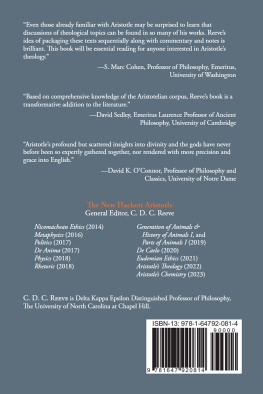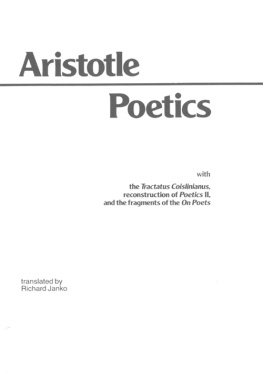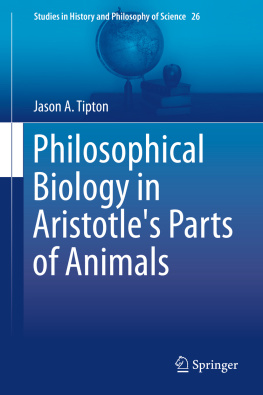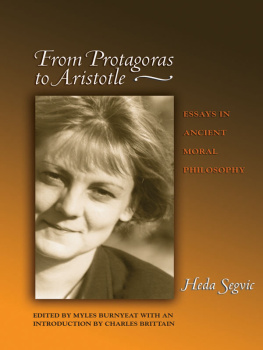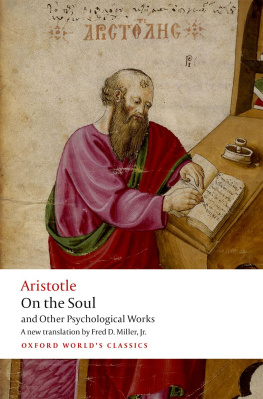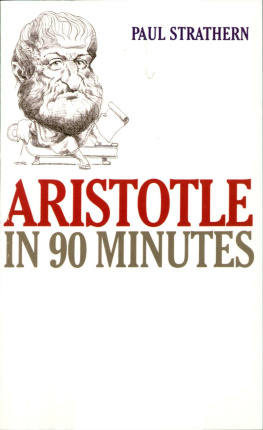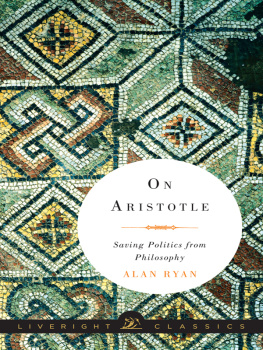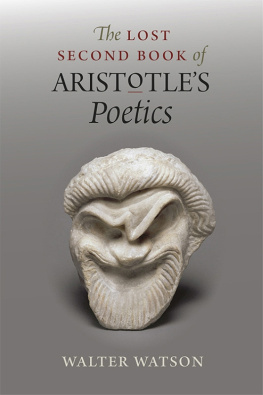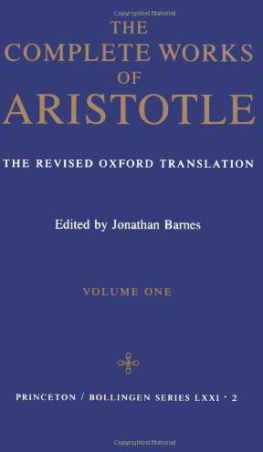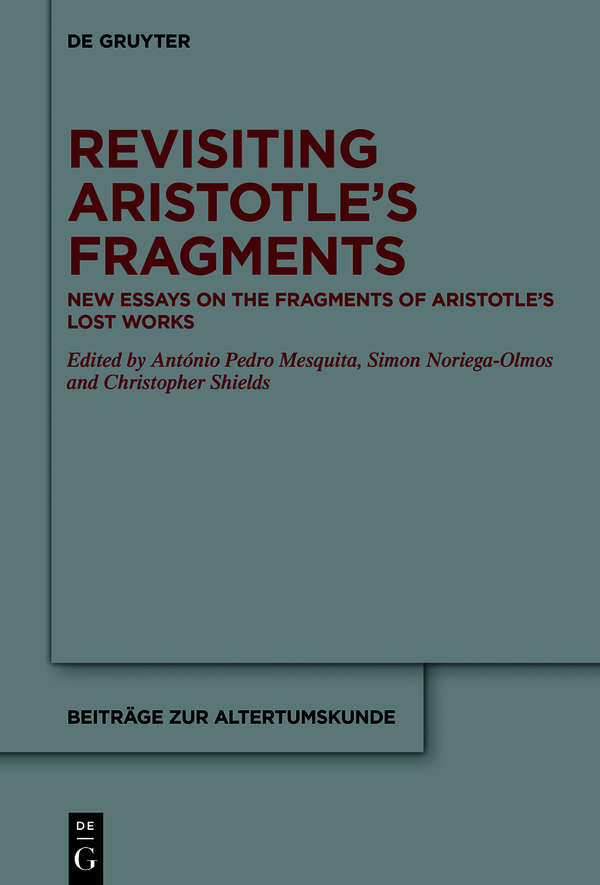Beitrge zur Altertumskunde
Edited by
Susanne Daub
Michael Erler
Dorothee Gall
Ludwig Koenen
Clemens Zintzen
Ernst Heitsch
Reinhold Merkelbach
Volume
ISBN 9783110679786
e-ISBN (PDF) 9783110679847
e-ISBN (EPUB) 9783110679939
Bibliographic information published by the Deutsche Nationalbibliothek
The Deutsche Nationalbibliothek lists this publication in the Deutsche Nationalbibliografie; detailed bibliographic data are available on the Internet at http://dnb.dnb.de.
2020 Walter de Gruyter GmbH, Berlin/Boston
Introduction
Antnio Pedro Mesquita
This book consists of a peer-reviewed selection of papers presented at the conference The Fragments of Aristotles Lost Works on July 6th and 7th, 2016, at the University of Lisbon. This conference was one of a series of academic events organised in Europe and North America in celebration of Aristotles 2400th anniversary. The Centre of Philosophy of the University of Lisbon (CFUL) hosted the conference at the initiative of the Centre for Historical Ontology (Heidelberg Helsinki Leuven) and with the full support of the Foundation for Science and Technology (FCT), the School of Arts and Humanities of the University of Lisbon (FLUL), and the project Complete Works of Aristotle: Translation and Commentary (PTDC/MHC-FIL/0787/2014). One achievement of this project was the first Portuguese translation of the fragments of Aristotles dialogues, the completion of which gladly coincided with the preparation of the event.
Like the conference, this book seeks to reignite work on Aristotles fragments and challenge existing paradigms of interpretation. It presents a reassessment of a considerable number of fragments of Aristotles lost works, and offers innovative ways of dealing with them. We expect this publication to have a specific place in the development of scholarship on Aristotles fragments, but equally hope its reassessment and innovative methodology will shed new light on the extant works of Aristotle.
The book fills a long gap in the bibliography on Aristotles lost works and fragments. In the second half of the nineteenth century, Valentin Rose was the first to assemble, organise, and edit the first modern collection of fragments and testimonies of Aristotles lost works (Rose (1863)). This collection, which subsequently appeared in several editions of different forms (Rose (1870) and (1886)), had a recognizable impact on Aristotelian scholarship. It helped to inaugurate an entirely new period in the study of Aristotle. This period saw the publications of trendsetting works such as Jaegers study of Aristotles development (Jaeger (1923)), the works of Bignone (1936) and Bidez (1943) on the lost Aristotle, as well as, among many others, Drings and Chrousts reconstructions of Aristotles lost Protrepticus (respectively, Dring (1961) and Chroust (1964)). For scholars of this period, there were two main sets of issues surrounding the fragments of Aristotles lost works. The first set concerned their authenticity and dating. The second explored how their content related both to Aristotles formative period under Plato in the Academy and to his philosophical production as reflected in the transmitted works.
Although the study of Aristotle fragments has ever since enjoyed an intermittent interest, including new editions and translations of the whole set of texts, this area of research has fallen into the background since the 1960s. This is surprising for at least two reasons. First, the liveliness of debates surrounding Aristotles fragments in earlier periods of scholarship. Second, it stands in stark contrast to the remarkable flourishing of Aristotelian scholarship in the last sixty years. In this period, the study of Aristotle has taken several different innovative and exciting directions. However, questions about origin, influence, development, and intellectual context have given way to an ever more prevalent interest in Aristotles thought on its own right. More specifically, developmental questions have given way to interest on Aristotles thought as represented in his extant writings. Comparative studies have in no small measure yielded to philosophical analysis and argument-criticism. To some extent, this prevailing lack of interest in comparative and developmental studies has resulted in a disregard for Aristotles fragments.
This situation is unfortunate, particularly if we take into consideration the fact that the currently keen concern with Aristotles philosophical argument itself offers or could offer a new assessment of developmental questions, and indeed of the material of the fragments independent of their role in such questions. In this sense, current preoccupations and methods could very well promise a new use for the fragments in assessing Aristotles philosophy. As things currently stand, Aristotle fragments need reassessment, and there is also great methodological potential in studying these materials afresh with new interests and methodologies. Precisely because of the advances in critical analysis of Aristotles texts, we are now in an optimal position to update the current scholarship on his fragments. Such an update is precisely the purpose of this book.
All this does not mean that our volume ignores discussion of authenticity and dating of fragments. On the contrary, it addresses these traditional issues within specific philosophical discussions and by articulating a new approach to Aristotles lost works. This new approach finds philosophical value in Aristotles fragments precisely in the bridges we can build between them and the transmitted works. From this perspective, we may view the fragments as tools of interpretation which we can use to shed light on Aristotles extant work and of course the extant works, in their turn, to shed light on the views of the fragments.
In many cases, we argue, where the extant Aristotle is sloppy or makes assumptions incomprehensible to the modern reader, the fragments can fill the gap. When a claim in the extant corpus is unsubstantiated, or an argument appears to be incomplete, the fragments can set the record straight. And where Aristotles motives are unclear, the fragments can provide needed context for the modern reader. To be sure, the fragments have a value on their own as remnants and testimonies of works lost to history. Even so, or indeed partly because of this value, they also have a value at the service of illuminating works of the extant Aristotelian corpus. This book provides secure ground for philosophical interpretation of endlessly debatable passages from the Physics, De anima, the biological treatises, the Metaphysics, Politics, Rhetoric and Poetics. At the same time, it challenges traditional assumptions about the dating of Aristotles lost works, his philosophical development, and the contents of the fragments.
The book divides into two parts. The first part, Philosophy and Philosophical Perspectives in Aristotles Fragments, focuses on Aristotles interests and perspectives in his lost exoterical writings, and particularly on how he worked out his understanding of philosophy in both his popular and scientific works. The second part, Philosophical Problems in Light of Aristotles Fragments, articulates a new approach to Aristotles lost works. It deals with issues of philosophical interpretation in Aristotles extant works, which fragments of lost Aristotelian works serve to illuminate. The philosophical issues treated in this section range from Theology to Natural Science, Psychology, Politics, and Poetics. The individual chapters are neither in agreement in terms of content nor unified in terms of methodology. For this reason, the chapters are not intended to be read as a continuous treatise. Instead, we invite the reader to explore different ways of reading the Aristotelian texts in order to forge an individual understanding of his work.


